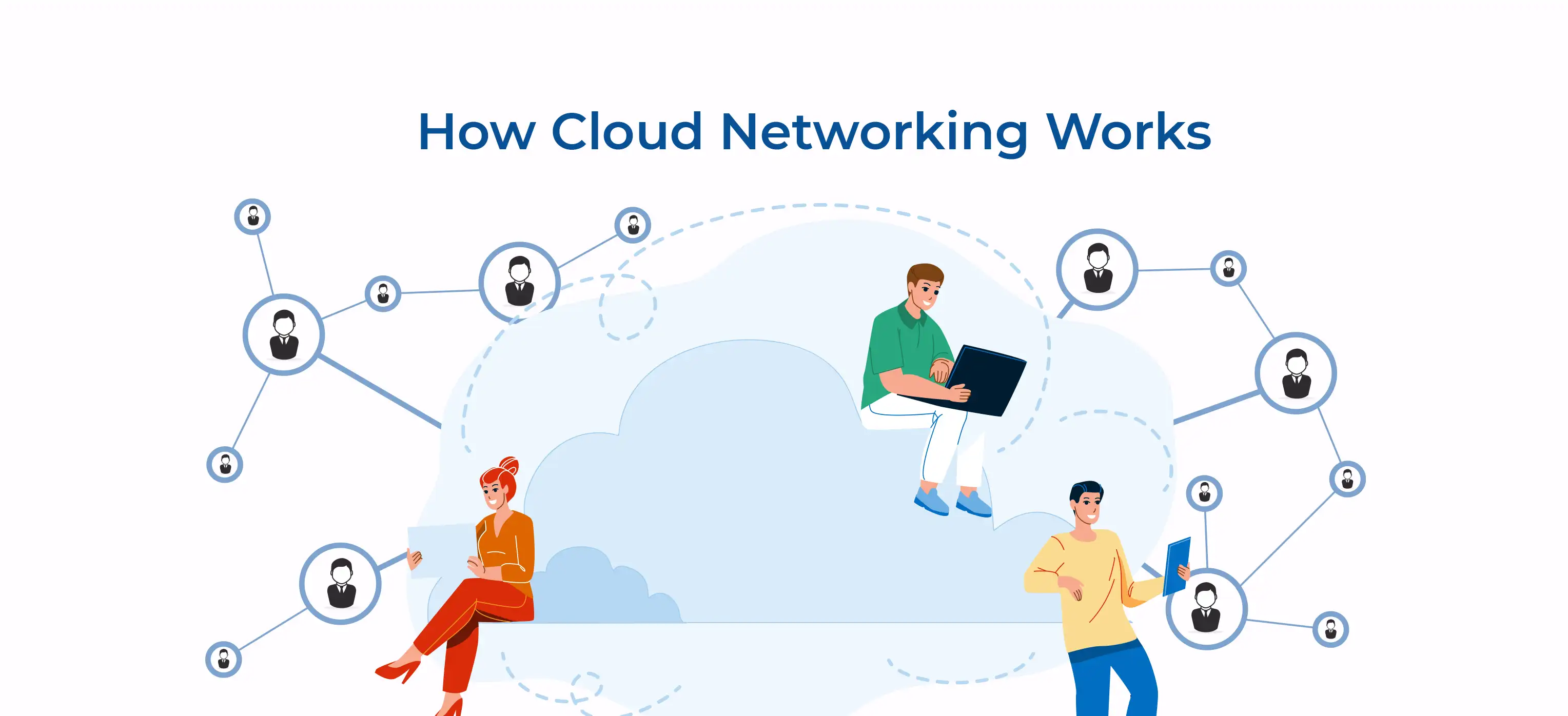 Piyush P
Dec 27, 2024
Piyush P
Dec 27, 2024

A large part or all assets of organizations are now hosted in the cloud, which is either in a public cloud, private cloud, or a hybrid cloud setup and this is alluded to as cloud organising. Organisations can construct complex networks by facilitating these organising assets in the cloud (virtual switches, network-the-board programming data transfer capacity, firewalls, and other apparatuses) depending on the situation.
The following accompanying systems can be facilitated in the cloud:
Also read: Cloud Computing Trends
The term ‘Cloud Networking’ refers to the network capabilities and resources of an organisation that is partially or entirely hosted in a public or private cloud platform. These resources are managed internally or by a service provider and made readily available on demand.
Companies can choose between using cloud-based networking resources in the public cloud, cloud-based networking resources on-premises to establish a private cloud network or a hybrid cloud combination of both. Virtual routers, firewalls, bandwidth control software and top cloud computing tools may be provided as needed among these network resources. This boost in the use of the cloud has increased the potential for employability. A lot of cloud computing certifications for cloud professionals are available in the market today. Obtaining one can definitely give you a head start when starting your career.
Businesses today use the cloud to boost scale, create differentiation, drive agility, and expedite time-to-market. For the modern corporation, the cloud model has evolved into an effective method for developing and delivering applications.
Additionally, the way businesses handle their expanding infrastructure requirements, regional expansions, and redundancy plans have been significantly influenced by cloud networking. Many businesses are utilizing different clouds from various cloud service providers and pursuing a multi-data centre strategy. Having cloud computing skills boosts your career as well as your business.
Cloud networking is a wise solution for businesses with expanding workloads for several reasons. There is a plethora of advantages of cloud computing. The following are some of the few reasons why you should opt for cloud networking:
Also read: Best Cisco Certifications
Cloud Networking infrastructures provide centralized management, control, and visibility. Depending on the sort of cloud service it is hosted on, cloud networking will be configured differently and is developed utilizing different types of cloud computing service models (SaaS, Iaas, PaaS). Cloud networking is developed using cloud-based services, and the configuration can vary depending on the type of cloud service being used. It's important to understand the specific networking requirements of your applications and choose a cloud service that meets those needs.
There are several types of cloud networks, each with its own characteristics and use cases. Here are some of the most common types of cloud networks:
Also read: How AWS Certifications can Boost your Cloud Computing Career?
Also read: Azure Cloud Services and Its Importance
Access to the data and programs that users use every day must be dependable and secure. However, new IT difficulties are emerging as a result of the increase in the use of apps and services across clouds and data centres. Organizations are also more susceptible to internet-based attacks as a result of the migration of programs to the cloud. Businesses are abandoning the "connect first, then authenticate" user model to overcome this problem. Taking everything into account, access is yielded considering the client's personality, region, and, shockingly, the device they're using thanks to a safe modernized edge including ADCs, web application firewalls, and secure web entryway parts.
Finally, it might be attempting to supervise and secure the sending of specific responses for handling each application across a variety of multi-cloud environments. Securing complete detectable quality and examination of the ventures, clients, and devices on the association is central.
Also read: AWS vs Azure: Which Cloud Platform Should You Choose?
Here is the list of other major locations where Edoxi offers Cloud Computing Certification Courses
| Country | UAE |
| Course Location | Dubai |

Microsoft Azure Certified Data Science Trainer
Piyush P is a Microsoft-Certified Data Scientist and Technical Trainer with 12 years of development and training experience. He is now part of Edoxi Training Institute's expert training team and imparts technical training on Microsoft Azure Data Science. While being a certified trainer of Microsoft Azure, he seeks to increase his data science and analytics efficiency.